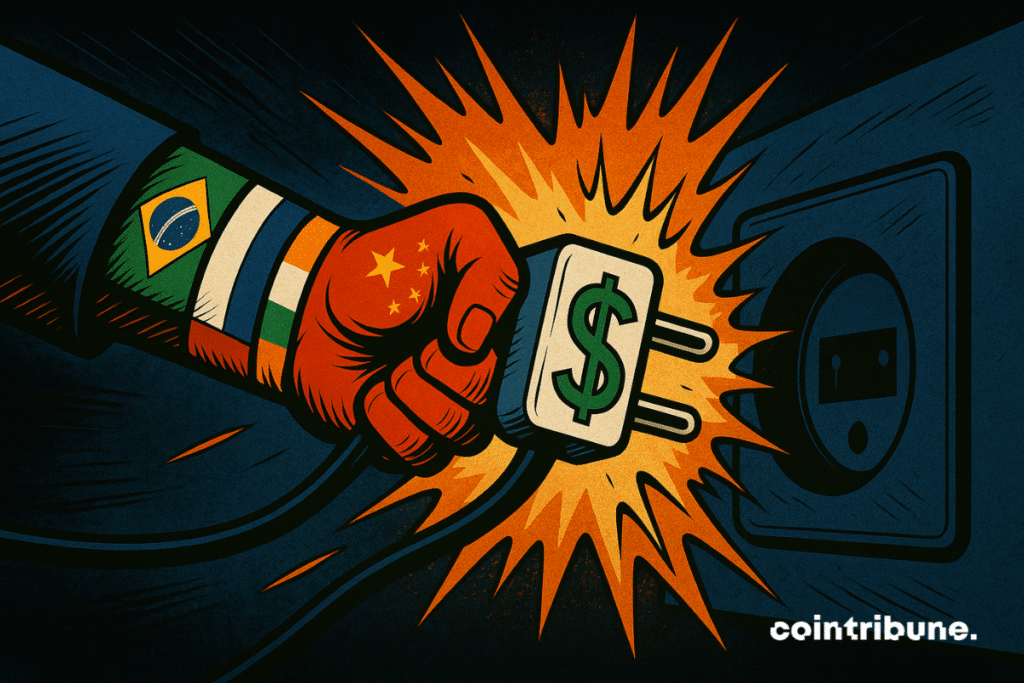Asia Dumps US Treasuries as Debt Fears Spike—Is the Dollar’s Reign Slipping?
Central banks across Asia are quietly—then not so quietly—ditching Uncle Sam’s IOUs. The move comes as US debt levels hit record highs and faith in fiscal stability erodes faster than a meme coin’s liquidity pool.
Hold my yen: Japan leads the exodus
Tokyo’s vaults once overflowed with Treasury bonds. Now? The Ministry of Finance’s balance sheet looks more like a degens’ altcoin portfolio—heavy rotation into gold and, whisper it, yuan-denominated assets.
The Singapore squeeze play
Not to be outdone, the Lion City’s sovereign funds are repricing risk with Swiss-watch precision. Their new calculus: Why earn 5% on decaying paper when tokenized real estate yields triple that?
Wall Street’s ’risk-free’ asset just got risky. And Asia isn’t waiting around to see how this debt ceiling kabuki theater ends.

In Brief
- Asian countries, notably the BRICS, are considering withdrawing up to $7.5 trillion of assets from the United States.
- This gradual disengagement has already begun, with China having sold $150 billion of U.S. Treasury bonds in 2024.
- The BRICS now prioritize diversifying their reserves, especially towards gold, considered safer than the dollar.
- If this trend intensifies, the U.S. risks losing its central position in the international monetary system.
An Asian Disengagement Already Underway
China, an influential BRICS member, is progressively reducing its holdings of U.S. Treasury bonds, a decision that is causing growing concern in global markets.
For several months, a discreet but consequential movement has been emerging. Other BRICS members and several Asian nations are following this momentum by also initiating a withdrawal from American financial assets, mainly Treasury bonds.
This withdrawal is already underway and fits into a logic of diversifying foreign reserves. Here are the most important factual elements:
- China has sold $150 billion of U.S. Treasury bonds in 2024, in a clear effort to reduce its dollar exposure ;
- This disengagement is not limited to China: other emerging economies within the BRICS bloc have begun liquidating their dollar assets to convert them, notably, into gold, considered safer ;
- Such a trend marks the end of a dominant economic model for decades, where Asia exported to the United States and then reinvested the revenues in U.S. debt ;
- Experts estimate that $7.5 trillion of Asian assets are still exposed to U.S. markets, a colossal sum, whose potential withdrawal would represent an unprecedented event for the American economy ;
- This shift is directly linked to the growing loss of confidence in the U.S.’s budget stability, whose debt has surpassed $36 trillion.
This strategic realignment is therefore not a theoretical anticipation: it is already underway. It stems from a desire to regain control over sovereign reserves, in a context of increasing trade tensions, geopolitical fragmentation, and growing distrust towards the United States’ financial trajectory.
The Rise of a New Financial Order Led by Emerging Countries
Beyond asset sales, it is the very logic of the post–World War II system that is being questioned. As Virginie Maisonneuve, head of investments at Allianz Global Investors, states: “We are witnessing a change in the world order, and I do not think we will return to the way things were before.”
According to her, this movement is largely linked to China’s rise, especially in technological and economic fields, which pushes emerging countries to assert their financial sovereignty more strongly.
Alongside the disinvestment, many countries are strengthening their Gold reserves and moving away from the dollar, which is increasingly seen as risky. The U.S. budgetary context, with debt now exceeding $36 trillion, increasingly worries foreign decision-makers.
They fear a medium- to long-term loss of value of the greenback, and consequently a devaluation of their holdings. This phenomenon now affects all of Asia beyond the BRICS, in a potentially irreversible monetary diversification movement.
If this trend confirms and accelerates, the consequences could be severe for the United States. Losing their privileged status as a destination for foreign reserves WOULD reduce their financial influence, as well as erode their ability to finance themselves at low cost. The declining dollar could then lose part of its global dominance with disastrous consequences, benefiting alternative assets or new reserve currencies that certain BRICS members, led by China, seem determined to promote. The chapter of the dollar-centered international monetary system is not yet closed, but the first lines of its epilogue may already be written.
Maximize your Cointribune experience with our "Read to Earn" program! For every article you read, earn points and access exclusive rewards. Sign up now and start earning benefits.

